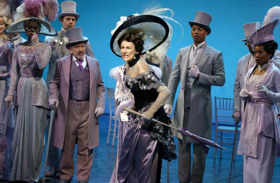Review Roundup: Did the New Cast of MY FAIR LADY Have a Little Bit of Luck with the Critics?
|

Just yesterday, My Fair Lady held a re-opening celebration to welcome new cast members Laura Benanti, Danny Burstein, Rosemary Harris, Christian Dante White, and Clarke Thorell.
The most beloved musical of all time, Lerner & Loewe's My Fair Lady returns to Broadway in a lavish new production from Lincoln Center Theater, the theater that brought you the Tony-winning revivals of South Pacific and The King and I.
Directed by Tony winner Bartlett Sher, the stellar cast tells the story of Eliza Doolittle, a young Cockney flower seller, and Henry Higgins, a linguistics professor who is determined to transform her into his idea of a "proper lady." But who is really being transformed?
The classic score features "I Could Have Danced All Night," "The Rain in Spain," "Wouldn't It Be Loverly" and "On the Street Where You Live." The original 1956 production won six Tony Awards including Best Musical.
Did the new cast have a little bit of luck with the critics?
Jesse Green, New York Times: I mean no disrespect to Lauren Ambrose, who originated the role in this revival, to say that Ms. Benanti is a more effortless vocalist; she dispatches her very difficult and wide-ranging songs with glee, whereas in Ms. Ambrose's performance, getting through them sometimes seemed like a metaphor for the character's struggle. Both ideas make for vivid theater, though the focus changes. Ms. Ambrose emphasized the way society limits a poor woman's development and opportunity; Ms. Benanti emphasizes the way a gift, and the means to exploit it, can lead to liberation. The show is lighter as a result, which is not to say it's less compelling. Ms. Benanti's scenes with Harry Hadden-Paton, remaining from the original cast as Higgins, are very finely observed, filled with the kind of new detail an extended run encourages.
Michael Dale, BroadwayWorld: Carrying herself with great poise, even when her broad cockney accent identifies her lack of refinement, this is an Eliza who, like that of her predecessor, is quite believable as someone who has already acquired a certain degree of sophistication, She just lacks the proper skills with which to voice it. Her handling of the Shaw/Lerner verbal wit is superb and there's a heartbreaking reaction where she reveals her disappointment with herself for what she sees as a moment of failure. And then there's that singing voice; a rich and warm soprano that matches the near-operetta quality of Loewe's compositions, teamed with impeccable phrasing and expression. This is a musical theatre master in a role that is worthy of her capabilities.
Robert Hofler, The Wrap: You've never met a more determined Eliza Doolittle than Laura Benanti's. Lincoln Center Theatre's revival of "My Fair Lady" continues in grand, sumptuous form under the direction of Bartlett Sher at the Vivian Beaumont, but with a big difference. Benanti's flower girl is no girl at all. She's an independent, grown-up woman who knows precisely what she wants in life even before Professor Henry Higgins overpays her for a bunch of posies in the marketplace of Covent Garden. All she needs is more money to buy new clothes, acquire some manners and lose her Cockney accent. As played by Benanti, Eliza isn't an ingénue on the verge of a fabulous new adventure like Lauren Ambrose, who previously starred in this revival. Rather, she sees Henry Higgins as the last best chance to escape her father, poverty and life on the street.
Steven Suskin, New York Stage Review: Needless to say, Benanti is enchanting as she sits on a workman's crate and dreams of a warm room with an enormous chair and all those choc'lates, vengefully wrathful as she dispatches the tormentful professor to a handy firing squad, and proudly (and surprisingly) triumphant as she properly hits her aitches in the tale of "The Rain in Spain." When Benanti almost immediately thereafter explodes into "I Could Have Danced All Night," we are dancing-figuratively-right alongside.
Elysa Gardner, New York Stage Review: Benanti serves Shaw's original vision, and his wit, with as much zest as her predecessor-and, it must be said, more palpable joy. Where Ambrose's Eliza, at least during the preview I caught, seemed to gain confidence (vocally, in particular) as the story progressed-cannily showing us the character's own growing pains on her path to self-actualization-Benanti's Eliza is more playful and feisty from the get-go, and wickedly funny, whether imagining herself conversing with the king in "Just You Wait" or introducing herself to the cream of British society, then spilling the beans on her low-born kin, at Ascot's opening horse race. The toll of this Eliza's journey is most keenly felt in her indignation and, eventually, fury in later scenes, when she reveals her frustration with being disrespected and objectified by Henry, in exchanges Benanti makes as biting as her comedic flourishes are hilarious.
Check back later for more reviews and click here to see what the critics had to say when the show opened last spring.
Videos
